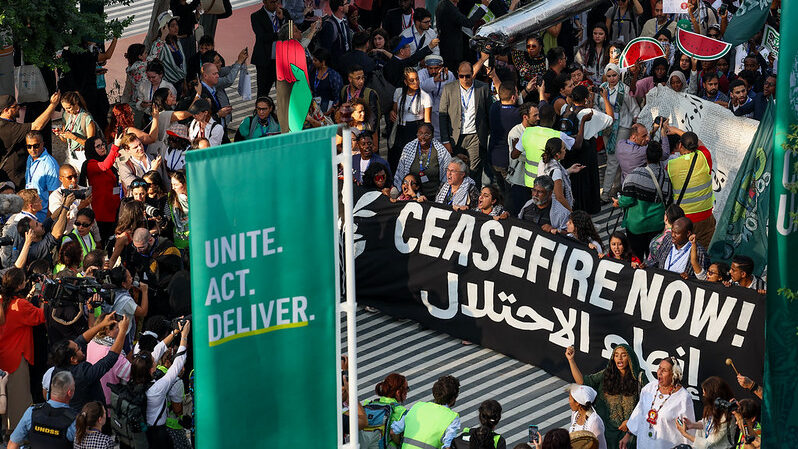Sign up to get our weekly newsletter straight to your inbox, plus breaking news, investigations and extra bulletins from key events
Climate-vulnerable countries are desperately trying to salvage a deal on adaptation after nine days of stalemate.
The big-ticket item in Dubai is the framework for the global goal on adaptation (GGA), a two-year-long exercise to turn the vague provisions of the Paris Agreement into something more concrete. Many hope clear definitions and targets will unlock money for adaptation that has been chronically underfunded.
But the 134-strong group of developing nations known as the G77 is divided.
The hardliners are the Arab group led by Saudi Arabia and the like-minded developing countries (LMDC) spearheaded by China. They have refused to work on any text that does not explicitly mention “common but differentiated responsibilities”, four sources in the room told Climate Home. Putting that in would trigger an automatic rejection from developed countries.
The least developed countries and small island states are increasingly frustrated.
“We’ve invested so much time and energy in this process,” a negotiator from a vulnerable country told Climate Home. “We’re now facing a very scary scenario: either no decision at all or a take-it-or-leave-it text creating a very symbolic framework.”
Meanwhile the mitigation work programme has made negligible progress on long-term emissions cutting measures. Again, LMDC and Arab states engaged in what two negotiators described to Climate Home as “clear obstruction tactics”, moving one islander to tears.
Some negotiators and observers told Climate Home they fear adaptation is being held hostage to talks over a possible fossil fuel phase-out.
An LMDC spokesperson rejected that interpretation. “We’ve been negotiating in good faith,” they said. “These are substantive matters with groups wanting to reopen texts that have already been agreed.”
Technical negotiations are due to finish today, with text expected on the adaptation goal and bilateral carbon trading rules.
The latest headlines
- Oil-reliant Azerbaijan chosen to host Cop29 climate talks
- Dutch initiative must turn the tables on fossil fuel subsidy reform – Ivetta Gerasimchuk, IISD
- To land fossil phase-out deal, rich nations must add fairness – Andreas Sieber, 350
Netherlands leads subsidy crackdown
Two months ago, thousands of climate activists braved water cannons to block a highway in Dutch capital The Hague in protest at fossil fuel subsidies.
Today, Dutch climate minister Rob Jetten announced twelve countries had signed up to his club to get rid of fossil fuel subsidies.
Those nations include nine Europeans – including France and Spain – Canada, Costa Rica and Antigua and Barbuda. Jetten said others are “sure” to join.
There have been many promises in the past on this, dating back to the G20 in Pittsburgh in 2009. So, IISD’s Ivetta Gerasimchuk writes, the follow-through is vital.
The countries have signed up to developing an agreed methodology and drawing up inventories of subsidies by Cop29. And an annual Cop dialogue on the issue.
Jetten tempered expectations, claiming that “half of all subsidies are tied up in international agreements” and therefore need cooperation to scrap.
And removing subsidies which make everyday things like driving, cooking and heating cheap can be unpopular. After a rise in the cost of driving sparked the “gilets jaunes” protests in 2018, French climate minister Agnès Pannier-Runacher is well aware of this.
She told the press conference today that this must work “for the planet of course” but also “for the people, for the economy, for the social equity and just transition”.
The only developing country minister present was Antigua and Barbuda’s Gaston Browne. He told Climate Home “we burn gasoline and diesel but even if even if it is more expensive that might very well serve as an incentive to go quickly to renewable energy”.

A network of at least 1900 bots on X (formerly Twitter) are promoting Cop28 in English and Arabic, according to analysis by Marc Owen Jones, professor at Hamad bin Khalifa University in Qatar. The bots praise the UAE and Cop president Sultan Al Jaber as climate heroes.
All mouth, no trousers – Analysis by Climate Action Tracker shows that from the flurry of pledges signed in the first week of Cop28, few have the “ambition, clarity, coverage or accountability” needed to keep align with 1.5C. Around a quarter of the emissions reductions promised are additional and achievable, it estimates.
Two conventions, one statement — For the first time, the UN climate and biodiversity conventions joined forces on a common agenda. China, as the presidency behind the Kunming-Montreal nature deal, cosigned a vague pledge with the UAE and 16 other countries to mobilise finance and align planning between nature and climate.
China backs phase-out? – China’s climate envoy Xie Zhenhua told Reuters that success at Cop28 will depend on whether countries can agree on phasing out fossil fuels. In a pre-Cop statement with the US, China fell short of calling for a phase out.
Read More

